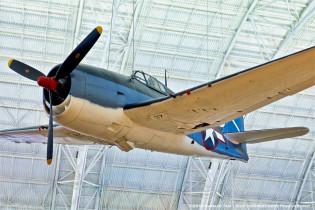 @ Steven F. Udvar-Hazy Center, Chantilly, VA.
@ Steven F. Udvar-Hazy Center, Chantilly, VA.
August 2018
Delivered to the U.S. Navy in February 1944, this Hellcat remained Stateside until it was converted into a F6F-3K target drone for a new role. Its mission was to be used in Operation Crossroads – the atomic bomb tests at Bikini Atoll. Instrumentation on board and photographic plates taped to the control stick obtained data on radioactivity. Several manned flights preceded the final unmanned flight on July 25, 1946, which evaluated the first underwater atomic bomb explosion. Records indicate that exposure of this aircraft to the radioactive cloud was minimal and residual radiation is negligible. The Hellcat had its last flight on March 25, 1947, and was assigned to the National Air Museum on November 3, 1948. First flown in 1942, the Hellcat would go into action with the US Navy and Marine Corps claiming 5,154 kills during World War II, giving it a kill ratio of 19:1. A total of 12,275 were built in just over two years, last ones serving with the Uruguayan Navy until 1960. Approximately six are in flyable condition with five more undergoing airworthy restoration. Fuji X-E2s w/18-55mm.
